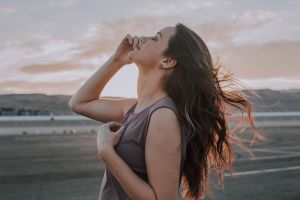The Better Body Confidence Report
There’s no getting away from the fact that people everywhere can feel self-conscious and get down about how their body looks. No matter what age, gender, shape, and size we are, we can all be impacted by what we see online, in magazines, the media and among friends.
Our latest research explores how prevalent body image issues are in the UK, how they impact everyday aspects of life, and what role social media in particular plays in constructing the body image we have of ourselves and others.
Male and Female Body Image in the UK
Unrealistic expectations of male and female bodies are plastered across media platforms on a consistent basis, so it may come as no surprise that 23% of men and 42% of women say they rarely or never feel body confident.
This lack of confidence also spills into our social lives, love lives, our mental health and even career progression, with a quarter of men saying low body confidence negatively affected their social and love life, while over a third of women say the same.
| Has low body confidence ever negatively affected you in the following ways? | ||
| Male | Female | |
| Negatively affected my social life | 25% | 35% |
| Negatively affected my love life | 25% | 35% |
| Negatively affected my mental health | 17% | 36% |
| Negatively affected my career progression | 11% | 7% |
The findings also show that men are less likely to celebrate body positivity than women. We conducted a social media analysis of Instagram, scraping through the top 1,000 posts tagged with the #bodypositivity hashtag, finding over 83% of all posts were made by or featured women. This compares with just 10% of posts made by or featuring men.
This finding is reflected in the survey results, with women feeling far more comfortable in discussing their body image with a friend (57%) than men would (39%). However, as the below data shows, 43% of men have received or know someone who has received online abuse directed at how their body looks, and a fifth of men admit to commenting negatively on someone else’s physical appearance - compared to just 8% of women.
| Which of the following have you ever done/experienced? | ||
| Male | Female | |
| I know someone who has received negative comments on their appearance online | 26% | 23% |
| I have received a negative comment on my appearance online | 23% | 15% |
| I have commented negatively on someone’s appearance online | 21% | 8% |
Three-quarters of 18–24-year-olds display body dysmorphia signs: How body confident are different generations?
When it comes to different age groups, our research shows that 81% of the 18–24-year-olds surveyed have displayed at least one sign of muscle dysmorphia. This includes consistently thinking about whether they’re muscular or lean enough, exercising despite illness or injury, feeling anxiety for missing a workout, giving up social or work obligations for the gym, or maintaining an extreme exercise programme.
This theme of younger generations feeling the effects of low body confidence impacting their lives runs throughout the data. They are the group most likely to have received negative comments about their appearance online (42%) or know someone who has (45%), while they are also the most likely to have commented negatively on someone’s appearance (40%). This highlights the detrimental effects of increased use of social media, and how intrinsically linked it is to feelings of body positivity and self-worth.
Younger people between the ages of 18 and 24 are also the group most likely to use protein supplements or special diets (43%), use steroids or similar substances (28%) or even get cosmetic surgery to enhance their appearance (15%).
Interestingly, it is an older group – those between the ages of 45 and 54 who claim to be the least body confident, with 44% of respondents in this age group saying they rarely or never feel body confident, highlighting again how varied the symptoms and impacts of low body confidence can be.
How can we improve our body confidence?
Regular exercise has a positive impact on wellbeing. We found that the biggest positive impact on people’s body confidence and the main motivators for regular physical activity are noticing physical changes such as weight loss (27%), general improvements to overall health (20%), and receiving compliments from others (15%).
As part of the research, we spoke to experts and influencers to gain insights into how to overcome body image problems. Sam Thomas, a writer, speaker & mental health advocate who has suffered with his body image and eating disorders, said:
“I started going to the gym for the first time and found weightlifting helped me to improve my confidence and self-esteem. I found when I went to the gym, I ate well and when I didn’t, I ate less so I consequently lost weight. The gym doesn't work for everybody in recovery from eating disorders, but it works for me! Fortunately, I've never felt peer pressure quite as much as my friends, so have avoided comparisons of what I see on the internet and my peers.
“More education and awareness are key so that the current and future generations don't become adversely affected by what they see and how it makes them feel.”
Meanwhile, Phil Hannen, Health Intervention Manager at Better explained:
“Exercise has a number of positive physical benefits as well as improving mental wellbeing. When exercising, your body releases chemicals that can improve your mood, make you feel less anxious and reduce stress and depression, it can also improve the function of the brain.
“In today’s pressured world, exercise is really important to keep good physical and mental health. Many men I have spoken to tell me that they use exercise as their escape from the stresses and pressures of every-day life and that it provides important ‘me time’.”
Physical and mental health is equally crucial in today’s world, and body image clearly plays a big part in both. However you choose to combat low body confidence, whether that be in the gym or the swimming pool, discussing with friends, family or your personal trainer, or even posting about it online, it’s important to find what works best for you and make sure you feel as comfortable in your body as you can.


